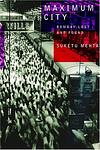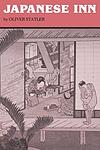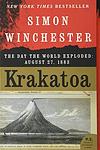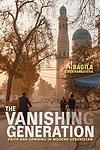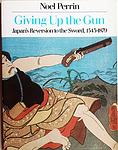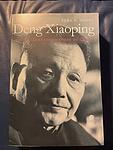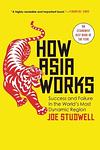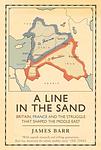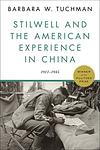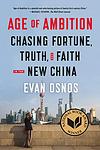The Greatest "Nonfiction, Asian History" Books Since 1950
Click to learn how this list is calculated.
This list represents a comprehensive and trusted collection of the greatest books. Developed through a specialized algorithm, it brings together 305 'best of' book lists to form a definitive guide to the world's most acclaimed books. For those interested in how these books are chosen, additional details can be found on the rankings page.
Genres
Asian History is a category of books that focuses on the historical events, cultures, and societies of Asia. This category includes books that cover a wide range of topics, including the ancient civilizations of China, Japan, and India, the rise and fall of empires, the impact of colonialism, and the modernization of Asian countries. It also includes books that explore the social, political, and economic changes that have shaped the region over time. Overall, Asian History provides readers with a comprehensive understanding of the rich and diverse history of Asia.
Countries
Date Range
Reading Statistics
Click the button below to see how many of these books you've read!
Download
If you're interested in downloading this list as a CSV file for use in a spreadsheet application, you can easily do so by clicking the button below. Please note that to ensure a manageable file size and faster download, the CSV will include details for only the first 500 books.
Download-
51. A History of the World in 100 Objects by Neil MacGregor
This book offers a unique perspective on world history, telling the story of humanity through the examination of 100 man-made objects. The author, a museum director, uses items from the British Museum, ranging from a 2 million-year-old Olduvai stone cutting tool to a contemporary credit card, to explore various themes such as trade, religion, art, science, and politics. The book provides a fascinating lens through which to view the evolution of human civilization.
The 8359th Greatest Book of All Time -
52. Japanese Philosophy by John C. Maraldo, Thomas P. Kasulis, James W. Heisig
This book provides a comprehensive overview of Japanese philosophy, exploring its unique characteristics and its evolution through history. It delves into the diverse intellectual traditions of Japan, including both well-known philosophical schools and lesser-known but equally significant ideas. The text examines how Japanese philosophy has been influenced by and has interacted with other philosophical traditions, particularly Western philosophy, while also highlighting its distinct approach to fundamental philosophical issues such as ethics, aesthetics, and the nature of reality. Through a detailed analysis, the book offers insights into how Japanese philosophical thought has contributed to broader philosophical discourse and how it reflects the cultural and historical context of Japan.
The 8447th Greatest Book of All Time -
53. Along The Ganges by Ilija Trojanow
The book is a travelogue that takes the reader on a captivating journey along the sacred Ganges River, from its source in the Himalayas to its delta in the Bay of Bengal. The narrative is rich with descriptions of the diverse landscapes, cultures, and people encountered by the author. It delves into the profound spiritual significance of the river to millions of Hindus, as well as the contemporary challenges it faces due to pollution and modernization. Through personal reflections and encounters, the author explores the complex relationship between the river and the civilization it has nurtured for centuries, offering insights into the historical, religious, and ecological aspects of this iconic waterway.
The 8468th Greatest Book of All Time -
54. Wrong About Japan by Peter Carey
In this travel memoir, a father and his anime-obsessed son embark on a journey to Japan in an attempt to understand the son's fascination with the country's pop culture. Their adventure leads them to meet manga artists, anime directors, and cultural commentators, through which they explore the nuances of Japanese animation and its historical contexts. As the father attempts to bridge the cultural gap and connect with his son, he confronts his own preconceptions and discovers the complexities of modern Japanese culture, which cannot be easily understood through the lens of Western perspectives. The narrative delves into themes of cultural exchange, the generational divide, and the search for authenticity in a land where the line between reality and fiction often blurs.
The 8468th Greatest Book of All Time -
55. Maximum City: Bombay Lost and Found by Suketu Mehta
This book offers a comprehensive exploration of Mumbai (formerly known as Bombay), one of the world's largest and most complex cities. The author weaves together personal experiences, interviews and observations to paint a vivid picture of the city's diverse inhabitants and their daily lives. The narrative delves into the city’s underworld, its entertainment industry, its religious tensions, and its political landscape, providing an in-depth look at the dichotomies of wealth and poverty, modernity and tradition, and order and chaos that define Mumbai.
The 8488th Greatest Book of All Time -
56. Empire Of Cotton: A Global History by Sven Beckert
"Empire of Cotton" by Sven Beckert is a comprehensive global history of cotton, exploring its impact on the world economy, politics, and society from the 18th century to the present day. Beckert argues that cotton played a crucial role in the development of capitalism, colonialism, and imperialism, and that its production and trade were intimately linked to the exploitation of labor, the growth of slavery, and the rise of industrialization. The book offers a fascinating and thought-provoking perspective on the complex and often violent history of cotton and its enduring legacy in the modern world.
The 8595th Greatest Book of All Time -
57. Japanese Inn by Statler, Oliver.
This book provides a captivating exploration of Japanese culture and history through the lens of a traditional inn, or ryokan, that has been operated by the same family for over a thousand years. Through detailed descriptions and engaging storytelling, the narrative delves into the inn's storied past, the generations of the family who have maintained it, and the myriad guests who have passed through its doors, from samurai to modern tourists. The work not only offers a unique lens into the evolution of Japanese hospitality and social customs but also reflects on the country's broader historical shifts and continuities. It is a richly woven tapestry that combines personal stories, historical events, and cultural insights, providing readers with a deep and nuanced understanding of Japan.
The 8750th Greatest Book of All Time -
58. Hiroshima Diary by Michihiko Hachiya
The book is a poignant and detailed personal account of the aftermath of the atomic bombing of Hiroshima, as recorded by a Japanese physician who survived the attack. The diary entries begin on August 6, 1945, the day Hiroshima was bombed, and continue for several weeks. Through his observations and experiences, the author provides a deeply human perspective on the devastation and suffering endured by the victims, as well as the immense challenges faced by the medical community. His writings not only document the physical and emotional toll of the nuclear attack but also reflect on the resilience and compassion that emerge amid such profound tragedy.
The 8750th Greatest Book of All Time -
59. Krakatoa by Simon Winchester
The book provides a comprehensive account of the catastrophic eruption of the Krakatoa volcano in 1883, one of the deadliest volcanic events in recorded history. It explores the geological and historical context leading up to the eruption, detailing the scientific discoveries and cultural impacts that followed. The narrative delves into the global effects of the eruption, such as climatic changes and spectacular sunsets observed worldwide, and examines its profound influence on the local and global political landscapes. Through a blend of history, science, and vivid storytelling, the book captures the awe-inspiring power of nature and its lasting impact on human society.
The 9012th Greatest Book of All Time -
60. The Vanishing Generation: Faith And Uprising In Modern Uzbekistan by Bagila Bukharbayeva
"The Vanishing Generation: Faith And Uprising In Modern Uzbekistan" explores the complex relationship between faith, politics, and social change in contemporary Uzbekistan. Through in-depth interviews and extensive research, the author delves into the lives of young Uzbeks who are navigating the challenges of religious identity, political repression, and the desire for societal transformation. This thought-provoking book sheds light on the struggles and aspirations of a generation caught between tradition and modernity in a rapidly changing society.
The 9029th Greatest Book of All Time -
61. Giving Up The Gun by Noel Perrin
"Giving Up The Gun" explores Japan's unique historical decision to abandon the use of firearms in warfare after initially adopting them in the 16th century. The book delves into the social, cultural, and political factors that influenced this remarkable reversal, highlighting Japan's focus on traditional samurai swordsmanship and the broader implications for Japanese society and its isolationist policies. Through a detailed examination of historical events and philosophical shifts, the narrative provides insights into how this decision shaped Japan's military and cultural development in the ensuing centuries.
The 9127th Greatest Book of All Time -
62. Deng Xiaoping And The Transformation Of China by Ezra F. Vogel
This book provides a comprehensive examination of the life and political career of Deng Xiaoping, a paramount leader who played a crucial role in steering China towards the path of reform and opening-up, transforming it from an impoverished, isolationist country into a global economic powerhouse. Through detailed research and analysis, the narrative delves into Deng's pragmatic approach to governance, his strategies for economic development, and his handling of domestic and international challenges. Highlighting his pivotal policies, leadership style, and the impact of his vision on China's modernization, the book offers an insightful look into the complexities of political leadership and the socio-economic evolution of one of the world's most populous nations.
The 9317th Greatest Book of All Time -
63. The Great Leveler : Violence And The History Of Inequality From The Stone Age To The Twenty First Century by Walter Scheidel
This book delves into the historical patterns of inequality, arguing that significant reductions in inequality have only ever been brought about by cataclysmic events, which the author terms as the "Four Horsemen": war, revolution, state collapse, and plague. Through a comprehensive examination of societal structures from the Stone Age to the modern era, it presents a compelling case that peaceful reforms have rarely led to lasting decreases in inequality. The work challenges readers to confront the uncomfortable reality that significant improvements in equality have often been forged in the crucible of immense human suffering, thereby questioning the prospects for achieving future equality without such extreme catalysts.
The 9341st Greatest Book of All Time -
64. How Asia Works by Joe Studwell
This book provides a comprehensive analysis of the economic development in nine Asian countries, focusing on the policies and strategies that have driven their growth. It contrasts successful economies like Japan, South Korea, and China with less successful ones in Southeast Asia, examining land reforms, manufacturing policies, and financial control. The author argues that the successful countries followed a similar developmental path by implementing land reform to support smallholder farming, focusing on manufacturing with strict productivity goals, and controlling the financial sector to support these policies. The book challenges conventional economic theories and offers insights into the mechanisms behind Asia's economic transformations.
The 9526th Greatest Book of All Time -
65. Delhi by Khushwant Singh
"Delhi" by Khushwant Singh is a captivating exploration of the city's rich history, culture, and people. Through vivid anecdotes and personal experiences, the author paints a vivid picture of Delhi's transformation from ancient times to the present day. From the Mughal era to British rule, and the struggles of Partition, Singh delves into the city's tumultuous past while highlighting its enduring charm. With a blend of wit and nostalgia, this book offers readers a delightful journey through the vibrant streets, monuments, and diverse communities that make up the heart of Delhi.
The 9597th Greatest Book of All Time -
66. A Line In The Sand by James Barr
This book delves into the complex history of the modern Middle East, focusing on the post-World War I era when Britain and France drew arbitrary borders, creating new nations and sowing the seeds for future conflicts. It examines the clandestine struggle between these colonial powers as they vied for dominance in the region, often at the expense of the local populations. The narrative reveals how the duplicitous actions and broken promises of Western powers during this period set the stage for enduring turmoil and established a legacy of distrust and instability that continues to affect the geopolitics of the Middle East to this day.
The 9715th Greatest Book of All Time -
67. Stilwell and the American Experience in China by Barbara Wertheim Tuchman
The book is a detailed historical account of the American military experience in China from 1911 to 1945, specifically focusing on the life and career of General Joseph Stilwell. The narrative provides an in-depth look at Stilwell's efforts to train Chinese troops during World War II, his clashes with Chiang Kai-shek, and his role in the complex political dynamics of the time. It also offers a broader exploration of American-Chinese relations during this period, highlighting the cultural misunderstandings and political tensions that marked this chapter in history.
The 10168th Greatest Book of All Time -
68. The Rising Sun by John Toland
"The Rising Sun" provides an in-depth historical account of Japan during World War II from the perspective of the Japanese. The book explores the political and military events leading up to the war, the conduct of the war itself, and the aftermath, including the bombings of Hiroshima and Nagasaki. The narrative is based on interviews, diaries, memoirs, and letters of the people who lived through these events, offering a unique and comprehensive look at Japan's role in the war.
The 10168th Greatest Book of All Time -
69. Empireland by Sathnam Sanghera
The book is a thought-provoking exploration of the British Empire's enduring impact on modern Britain. It delves into the ways in which imperialism has shaped the nation's psyche, politics, economy, and identity, often in ways that are overlooked or forgotten. Through a combination of personal memoir, historical analysis, and contemporary observation, the author challenges readers to confront the legacies of colonialism, including racism and cultural appropriation, and to recognize how the empire's influence permeates various aspects of British life, from its institutions to its global relationships. The work serves as a call to acknowledge and address this complex inheritance in order to better understand present-day Britain.
The 10476th Greatest Book of All Time -
70. Crusade and Jihad: Islam and the Christian World by Bassam Tibi
This book explores the historical, ideological, and political aspects of the Crusades and Jihad, comparing and contrasting the two. It delves into the origins and evolution of the Crusades and Jihad, their impact on Christian and Islamic societies, and their relevance in today's world. The author also examines the role of religion in conflicts and the use of religious ideologies for political purposes, providing a comprehensive understanding of these complex issues.
The 10487th Greatest Book of All Time -
71. Embracing Defeat: Japan in the Wake of World War II by John W. Dower
This book provides a detailed exploration of Japan following World War II, focusing on the country's defeat and subsequent occupation by Allied forces. It delves into the profound changes in Japanese society, politics, and culture during this period. The narrative captures the struggles of ordinary Japanese people, their feelings of guilt and shame, as well as their efforts to rebuild their lives and nation. It also examines the role of the United States in shaping post-war Japan, highlighting the complexities and contradictions of this transformative era.
The 10621st Greatest Book of All Time -
72. Hirohito and the Making of Modern Japan by Herbert P. Bix
This book provides a comprehensive and controversial historical account of Emperor Hirohito of Japan, debunking the popular belief that he was a mere figurehead during World War II. Instead, the book argues that Hirohito was actively involved in the decision-making processes that led Japan into the war, and that he managed to escape blame for the nation's actions due to clever political maneuvering during the post-war period. The book also explores Hirohito's role in shaping modern Japan, detailing his influence on its military, political, and cultural institutions.
The 10635th Greatest Book of All Time -
73. Ghost Wars by Steve Coll
"Ghost Wars" is an in-depth exploration of the complex history of Afghanistan from the Soviet invasion in 1979 to just before the terrorist attacks of September 11, 2001. The book provides an intricate account of the CIA's role and America's foreign policy in Afghanistan, the rise of the Taliban, and the emergence of Osama Bin Laden. It also details the numerous missed opportunities to capture or kill Bin Laden, and the failure to prevent the 9/11 attacks.
The 10680th Greatest Book of All Time -
74. Age of Ambition: Chasing Fortune, Truth, and Faith in the New China by Evan Osnos
"Age of Ambition: Chasing Fortune, Truth, and Faith in the New China" is a vivid exploration of contemporary China. The book delves into the lives of everyday citizens, from dissidents to entrepreneurs, and their pursuit of wealth, freedom, and faith amidst the country's rapid modernization. It provides an in-depth look into the country's socio-political landscape, including its struggles with censorship and corruption, as well as the aspirations and challenges faced by its people in the face of change.
The 10765th Greatest Book of All Time -
75. Autumn In The Heavenly Kingdom by Stephen R. Platt
This book provides a detailed historical account of the Taiping Rebellion, one of the most devastating civil wars in history, which took place in 19th-century China. It challenges the conventional Eurocentric perspective by focusing on the dramatic narrative of this conflict and its charismatic leaders, such as Hong Xiuquan, who led a movement to overthrow the Qing dynasty amidst the backdrop of the Opium Wars. The narrative not only explores the massive human cost and the geopolitical stakes but also examines the significant impact of these events on international relations and how they shaped the modern world.
The 11065th Greatest Book of All Time
Reading Statistics
Click the button below to see how many of these books you've read!
Download
If you're interested in downloading this list as a CSV file for use in a spreadsheet application, you can easily do so by clicking the button below. Please note that to ensure a manageable file size and faster download, the CSV will include details for only the first 500 books.
Download



